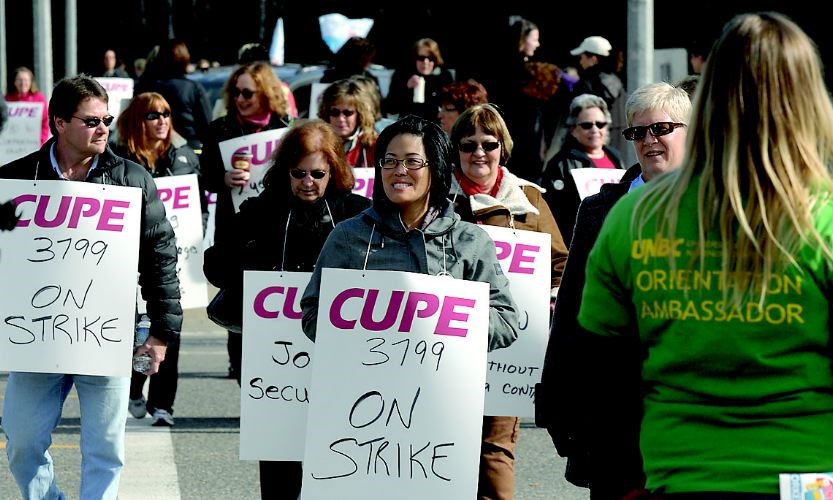Traffic in and out of UNBC slowed to a crawl Thursday afternoon, and that gave striking support staff a chance to use their voices, show their signs and hand out pamphlets to inform passing motorists why they walked off their jobs.
About 300 striking workers paraded up and down the front entrance along University Way to express their displeasure with the provincial government's net-zero stance on wage increases.
UNBC workers have been without a contract since June 2010 and in their job action, wages and job security were at the heart of the dispute.
Leslie Day, the executive assistant to the acting dean of student success and enrollment management at UNBC, loves her job and the people she works with, but after two years of net-zero public sector wage offers she says they are tired of hearing the provincial government can't afford to meet their cost of living wage increase demands.
"We've watched the president and the provosts' salaries increase over the past several years, and if there's money for them, why is there no money for us?," asked Day. "Being left without a contract is a pretty loud signal they don't value our contribution. The province has used their mandate to impose restrictions on what the universities can talk about and what the can or can't bargain. UNBC is full of wonderful people with strong leadership and those leaders need to go back to the province and tell them this kind of iron-fisted tactic isn't going to work."
Day is also concerned B.C. universities will start contracting out employees and bring in shared services, which she said could result in job losses at UNBC. The union fears CUPE jobs being targeted include facilities, maintenance, grounds, recruitment, benefit plans, printers, procurement and information technology.
"We just want answers," said Day. "They have the information, they've been doing the research, they've been having the meetings, why can't we know too?"
There are no new negotiations scheduled but both sides are anxious to resume bargaining. Speaking for UNBC management, vice-president Rob Van Adrichem said the university has to act on the directions it's being given by the provincial government.
"We're negotiating with our union local but as a public entity we have a mandate within which we have to operate and we're just trying to do what we can here to come to an agreement that's in the best interests of the employees and the university," said Van Adrichem.
"I can appreciate [unionized staff wanting higher wages]. The university has been in a period, as well, where we've had flat government funding for a couple of years, and it costs more to operate the school."
Van Adrichem said the cost-cutting job-sharing measures being discussed in the province's Administrative Service Delivery Transformation Project are strictly a provincial initiative.
"If those conversations are going on provincially it's not in our control," Van Adrichem said. "I appreciate the relationship we have with the CUPE membership as well as the executive. They've been very open with management and we've been open with them and that's helped to minimize disruption today."
Advanced Education Minister John Yap was unavailable for comment.
CUPE Local 3799 includes UNBC's campus security staff, food service workers, tradespeople, parking attendants and student housing employees. Union local president Caroline Sewell said a small number of support staff remained on the job during Thursday's walkout to maintain the campus power plant, provide security and to administer the Northern Medical Program.
The strike was a first in Steve Patton's work history. Now in his eighth year as UNBC's maintenance supervisor, he hopes it's the last time he'll be seen wearing a picket sign.
"Sometimes these things have to happen to get a fair wage," said Patton, who oversees a campus crew of 25 maintenance workers, tradespeople and secretarial staff.
"Everything goes up except the wages. They're talking about contracting out and we might lose positions. It could be a couple years from now but we've heard rumours it might be privatized. We're hoping they're paying attention and they come to the table and make a deal."
Thursday's collective job action also involved CUPE support staff at UBC, UBC-Okanagan, UVic, Thompson Rivers University, and Royal Roads University.
"Everybody is going through the same issues and I think we just need to show solidarity, there's always strength in numbers," said Julie McMahon, a graduate studies assistant at the UNBC registrar's office. "People aren't asking for huge wage increases, they just want to be able to meet the cost of living as things go up and make sure they don't contract out our jobs."



